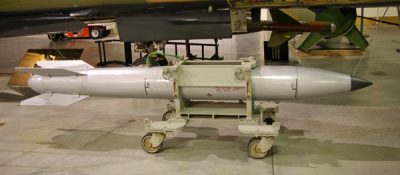Pentagon Test Drops B61-12 Tactical Nuclear Weapon “Dud” From B-2 Stealth Bomber Over Nevada

The US Air Force has tested the B61-12 nuclear bomb by dropping a dud from a B-2 Spirit stealth bomber over Nevada, as part of an ambitious project to extend the service life of the bomb, introduced in 1968, by another 20 years.
“The Department of Energy’s National Nuclear Security Administration (DOE/NNSA) and the US Air Force completed two non-nuclear system qualification flight tests of the B61-12 gravity bomb on June 9 at Tonopah Test Range in Nevada,” the Department of Energy announced last week. “These tests are the first such end-to-end qualification tests on a B-2A Spirit Bomber for the B61-12.”
The experiments included running trials on “NNSA designed bomb assembly and US Air Force acquired tail-kit,” as part of the effort to evaluate the “aircraft’s capability to deliver the weapon and the weapon’s non-nuclear function.”
Different versions of the B-61 nuclear gravity bomb have been deployed across the US and NATO bases for five decades. While, over the years, the Pentagon produced numerous modifications to the deadly weapon, B61 variants of 3, 4, 7, and 11 remain in service.
The Pentagon is currently in the middle of the $7.6 billion ‘B61-12 Life Extension Program’, which aims to “refurbish, reuse, or replace all of the bomb’s nuclear and non‐nuclear components” and extend the service life of the B61 by at least 20 years. The “first production unit” is scheduled for completion in 2020.
Besides deploying B61-12 on modern and future long range bombers, the Pentagon is making sure the bomb can be easily used by F-15E fighter jets, and wants to integrate it with the F-35 Lightning II fifth generation combat jets, raising concerns it is creeping towards lowering the threshold for tactical use of nuclear weapons.
After former President Barack Obama authorized a nuclear modernization program, Trump revised it into an ambitious 30-year project that would cost at least $1.2 trillion to complete. Some $800 billion will be spent on maintaining nuclear forces, while about $400 billion will be spent on modernizing them, under the pretext of an existential need to deter “revisionist powers” such as China and Russia.
Russia has repeatedly expressed concerns over a loosening of nuclear launch guidelines under Trump’s Nuclear Posture Review (NPR), which says that non-nuclear attacks which result in mass casualties or target key infrastructure constitute enough grounds for a US nuclear retaliation. Moscow also warned that deploying more B61 bombs to NATO bases in Europe would also violate the nuclear non-proliferation treaty.
Meanwhile, to justify taxpayer spending on nuclear upgrades, Washington constantly points the finger at Russia, accusing it of threatening its neighbors and US national security.
“Russia has demonstrated its willingness to use force to alter the map of Europe and impose its will on its neighbors, backed by implicit and explicit nuclear first-use threats,” the NPR report claims, despite Russian military doctrine clearly stating that nukes can only be used in response to a nuclear attack, or when the state’s very existence is put under threat by a massive conventional attack.

